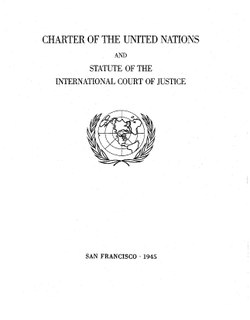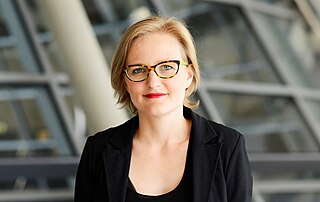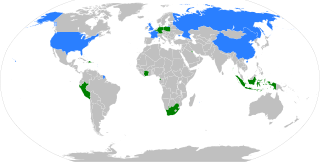| Part of the Politics series |
| Elections |
|---|
 |
| Basic types |
| Terminology |
| Subseries |
| Lists |
| Related |
| |
Several supranational elections were held in 2014.
| Part of the Politics series |
| Elections |
|---|
 |
| Basic types |
| Terminology |
| Subseries |
| Lists |
| Related |
| |
Several supranational elections were held in 2014.

The Council of Europe is an international organisation founded in the wake of World War II to uphold human rights, democracy and the rule of law in Europe. Founded in 1949, it has 47 member states, with a population of approximately 820 million, and operates with an annual budget of approximately 500 million euros.

The politics of Kazakhstan takes place in the framework of a presidential republic, whereby the President of Kazakhstan is head of state and nominates the head of government. Executive power is exercised by the government. Legislative power is vested in both the government and the two chambers of parliament.

The United Nations General Assembly is one of the six principal organs of the United Nations (UN), serving as the main deliberative, policymaking, and representative organ of the UN. Its powers, composition, functions, and procedures are set out in Chapter IV of the United Nations Charter. The UNGA is responsible for the UN budget, appointing the non-permanent members to the Security Council, appointing the Secretary-General of the United Nations, receiving reports from other parts of the UN system, and making recommendations through resolutions. It also establishes numerous subsidiary organs to advance or assist in its broad mandate. The UNGA is the only UN organ wherein all member states have equal representation.

The Charter of the United Nations is the foundational treaty of the United Nations, an intergovernmental organization. It establishes the purposes, governing structure, and overall framework of the UN system, including its six principal organs: the Secretariat, the General Assembly, the Security Council, the Economic and Social Council, the International Court of Justice, and the Trusteeship Council.

The United Nations Human Rights Council (UNHRC) is a United Nations body whose mission is to promote and protect human rights around the world. The Council has 47 members elected for staggered three-year terms on a regional group basis. The headquarters of the Council is in Geneva, Switzerland.
Since the late 1990s there have been many calls for reforms of the United Nations (UN). However, there is little clarity or consensus about what reform might mean in practice. Both those who want the UN to play a greater role in world affairs and those who want its role confined to humanitarian work or otherwise reduced use the term "UN reform" to refer to their ideas. The range of opinion extends from those who want to eliminate the UN entirely, to those who want to make it into a full-fledged world government. Secretary Generals have presented numerous ways to implement these new reforms. There have been reform efforts since the creation of the UN and closely associated with each of the Secretary-Generals.

The Group of Western European and Other States, also known as the Western European and Other States Group or WEOG, is one of the five United Nations regional groups and is composed of 28 Member States mainly from Western Europe, but also from Oceania, North America, and Western Asia.
Minority rights are the normal individual rights as applied to members of racial, ethnic, class, religious, linguistic or gender and sexual minorities; and also the collective rights accorded to any minority group.

The United Nations Regional Groups are the geopolitical regional groups of member states of the United Nations. Originally, UN member states were unofficially grouped into five geopolitical regional groups. What began as an informal means of sharing the distribution of posts for General Assembly committees has taken on a much more expansive role. Many UN bodies are allocated on the basis of geographical representation. Top leadership positions, including Secretary-General and President of the General Assembly, are rotated among the regional groups. The groups also coordinate substantive policy and form common fronts for negotiations and bloc voting.

France has been a member of the United Nations (UN) since its foundation in 1945 and is one of the five nations, alongside China, Russia, the United Kingdom and the United States, that holds a permanent spot on the United Nations Security Council (UNSC), which is responsible for maintaining international peace and security. France has contributed to the organisation over the years through its leadership and sponsorship of various resolutions and other major UN bodies as well as being one of the largest-contributing states to both the general budget and to the peacekeeping operations budget. Several French Presidents have openly spoken of their support for the UN and its aims and there are clear links between France’s own policies and the values which the UN espouses, particularly concerning human rights. In the last decade, France has called for, proposed and supported various reforms on the UNSC and their Peacekeeping Operations (PKO). The UN, since its foundation, represents the core of France’s engagement with the multilateral international system.

Franziska Katharina Brantner is a German politician of the Green Party. She was a Member of the European Parliament (MEP) from 2009 to 2013, and since 2013 she has been a member of the German Parliament.

The Group of Eastern European States (EEG) is one of the five United Nations regional groups and is composed of 23 Member States from Eastern, Central and Southern Europe.

The European Union (EU) has had permanent observer status at the United Nations (UN) since 1974, and has had enhanced participation rights since 2011. The EU itself does not have voting rights but it is represented alongside its 27 members, one of which, France, is a permanent member of the Security Council.

The 2014 United Nations Security Council election was held on 16 October 2014 during the 69th session of the United Nations General Assembly, held at United Nations Headquarters in New York City. The elections were for five non-permanent seats on the UN Security Council for two-year mandates commencing on 1 January 2015. In accordance with the Security Council's rotation rules, whereby the ten non-permanent UNSC seats rotate among the various regional blocs into which UN member states traditionally divide themselves for voting and representation purposes, the five available seats were allocated as follows:

The political status of Nagorno-Karabakh has remained unresolved since Azerbaijan's recognition as an independent state in 1991. During the Soviet Union, it had been an ethnic Armenian autonomous oblast of the Azerbaijan Soviet Socialist Republic; however, the disintegration of the USSR was accompanied by the conflict between local Armenians who sought to join Nagorno-Karabakh to Armenia, and local Azerbaijanis who opposed this. The conflict soon boiled over into open warfare in the First Nagorno-Karabakh War and ethnic cleansing, as a result of which Karabakh - as well as 7 surrounding regions of Azerbaijan - came to be occupied by an Armenia-allied de facto state, the Republic of Artsakh. Negotiations took place sporadically over the following decades, during which a ceasefire generally prevailed between Armenia / Artsakh and Azerbaijan. Turkey and Azerbaijan closed their borders to Armenia and Artsakh, and took other diplomatic steps to isolate them. Meanwhile, the United Nations Security Council, OSCE Minsk Group, and other bodies made various statements and proposed dialogue initiatives; none of them successful. In the 2020 Nagorno-Karabakh war, Azerbaijani forces, backed by Turkey, entered the Artsakh-held territories and retook the southern half of the region, including Shusha. Armenia was forced to concede additional territories in order to preserve Stepanakert and the northern half of the Republic of Artsakh under local Armenian control. The political status of this reduced region was not specified in the agreement, and remains unresolved.
Marina Schuster is a German politician of the liberal Free Democratic Party.

The 2018 United Nations Security Council election was held on 8 June during the 72nd session of the United Nations General Assembly, held at United Nations Headquarters in New York City. The elections were for five non-permanent seats on the UN Security Council for two-year mandates commencing on 1 January 2019.

The Seventieth Session of the United Nations General Assembly opened on 15 September 2015. The President of the United Nations General Assembly was from the Western European and Others Group.
The People's Socialist Republic of Albania joined the United Nations on 14 December 1955, and has participated in several UN peacekeeping operations. The current Representative of Albania in the UN is Ms. Besiana Kadare, who is also a Vice President of the United Nations General Assembly for its 75th session. Albania was voted to become a member of the 15-country UN Security Council for a two-year term, in 2022-23.

José Ignacio "Nacho" Sánchez Amor is a Spanish politician who was elected as a Member of the European Parliament in 2019.